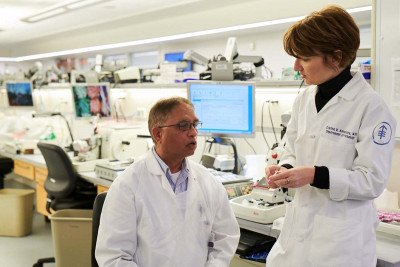
MSK pathologists, like Cristina Antonescu (right), are highly skilled at diagnosing even the rarest types of soft tissue sarcoma.
Getting an accurate diagnosis is crucial to getting the best care for soft tissue sarcoma. By making absolutely sure that we have diagnosed the correct sarcoma type, we can better determine the most effective treatment approach for you.
Diagnosing soft tissue sarcoma is not straightforward. When people come to us for a second opinion, our pathologists change their diagnosis approximately 15 percent of the time.
At MSK, we review your medical history, assess your overall health, and use imaging tests, such as CT and PET scans or MRI, to get a complete picture of the disease.
While these tests are very helpful, the gold standard for diagnosing soft tissue sarcoma is a biopsy. In this procedure, we take a tiny sample of the tumor so that a pathologist (a doctor who is specially trained to diagnose disease) can look at it under a microscope.
Genetic Sequencing of Soft Tissue Sarcoma
There are more than 80 types of soft tissue sarcoma. Many have unique genetic characteristics. These allow us to identify exactly which soft tissue sarcoma to diagnose. Our pathologists are experts at recognizing the variations in soft tissue sarcoma types and determining the best treatment. In fact, when our pathologists are asked for a second opinion about soft tissue sarcoma, we change the diagnosis about 15 percent of the time.
We use genetic and molecular sequencing on the tumors of nearly all our patients with soft tissue sarcoma. By making absolutely sure that we have diagnosed the correct sarcoma type, we can better determine the most effective treatment approach.
Sarcoma Genome Project
Memorial Sloan Kettering researchers lead a collaboration with the Broad Institute of the Massachusetts Institute of Technology and Harvard called the Sarcoma Genome Project. The goal of the Sarcoma Genome Project is to better define the different types of soft tissue sarcoma. Ultimately, the goal is to use this information to develop better therapies.
Soft Tissue Sarcoma Staging
After we evaluate the sample from the biopsy and complete any imaging studies that might help, we stage the tumor. Staging soft tissue sarcoma involves identifying the location of the tumor and how far it may have spread. Once the tumor is staged, we can design a personalized treatment strategy for you.
Request an Appointment
Available Monday through Friday, to (Eastern time)



